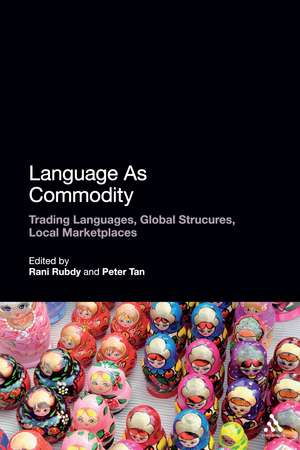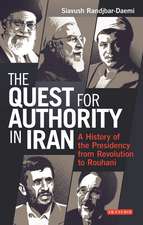Language As Commodity: Global Structures, Local Marketplaces
Editat de Dr. Rani Rubdy, Peter Tanen Limba Engleză Paperback – 20 sep 2008
| Toate formatele și edițiile | Preț | Express |
|---|---|---|
| Paperback (1) | 298.74 lei 3-5 săpt. | |
| Bloomsbury Publishing – 20 sep 2008 | 298.74 lei 3-5 săpt. | |
| Hardback (1) | 1007.20 lei 6-8 săpt. | |
| Bloomsbury Publishing – 20 sep 2008 | 1007.20 lei 6-8 săpt. |
Preț: 298.74 lei
Preț vechi: 326.36 lei
-8% Nou
Puncte Express: 448
Preț estimativ în valută:
57.17€ • 61.13$ • 47.66£
57.17€ • 61.13$ • 47.66£
Carte disponibilă
Livrare economică 27 martie-10 aprilie
Preluare comenzi: 021 569.72.76
Specificații
ISBN-13: 9781847064233
ISBN-10: 184706423X
Pagini: 248
Ilustrații: 10
Dimensiuni: 156 x 234 x 20 mm
Greutate: 0.39 kg
Ediția:New.
Editura: Bloomsbury Publishing
Colecția Continuum
Locul publicării:London, United Kingdom
ISBN-10: 184706423X
Pagini: 248
Ilustrații: 10
Dimensiuni: 156 x 234 x 20 mm
Greutate: 0.39 kg
Ediția:New.
Editura: Bloomsbury Publishing
Colecția Continuum
Locul publicării:London, United Kingdom
Caracteristici
The emergent economies of Asian countries have given their languages a whole new value in the global language commodity marketplace. This volumes looks at the how and the why of this accelerating trend.
Cuprins
Introduction, Peter KW Tan (National University of Singapore, Singapore) and Rani Rudby (National Institute of Education, Nanyang Technological University, Singapore) 1. Dimensions of Globalization and Applied Linguistics, Paul Bruthiaux (Nanyang Technological University, Singapore) 2. Linguistic Instrumentalism in Singapore, Lionel Wee (National University of Singapore, Singapore) 3. The Commodification of Malay: trading in futures, Lubna Alsagoff (National Institute of Education, Nanyang Technological University, Singapore) 4. Beyond Linguistic Instrumentalism: the place of Singlish in Singapore, Huan Hoon Chng (National University of Singapore, Singapore) 5. Linguistic Pragmatism and Globalization in Singaporean Chinese homes, Bee Chin Ng (Nanyang Technological University, Singapore)6. Anatomies of Linguistic Commodification, T Ruanni F Tupas (National University of Singapore, Singapore) 7. The English language as a commodity in Malaysia:The view through the medium-of-instruction debate, Peter K W Tan (National University of Singapore, Singapore) 8. English in India: the privilege and privileging of social class, Rani Rubdy (Nanyang Technological University, Singapore) 9. Negotiating language value in multilingual China, Agnes Lam and Wenfeng Wang (University of Hong Kong, Hong Kong) 10. Language Policy, Vernacular Education and Language Economics in postcolonial Africa, Nkonko Kamwangamalu (Howard University, Washington D.C., USA) 11. On the Appropriateness of the Metaphor of LOSS, David Block (University of London, UK) 12. The commoditization of English and the BolognaProcess: Global products and services, exchangemechanisms and trans-national labour, Jinghe Han (University of Western Sydney, Australia) & Michael Singh (University of Western Sydney, Australia) Index
Recenzii
Mention -Book News, February 2009
The link between discourse, globalization and language policies and practices is one that this book introduces us to in a comprehensive way, and it is hoped that more volumes on this area of research will be seen in the future.
...every chapter challenges and informs our thinking and understanding of language planning and policy, language commodification, globalisation and neoliberalism and, inevitably, the imposition of English around the world.
An excellent source for case studies... and as a reference work for students and instructors in the social sciences. We will use it in our classes.
In the eyes of this reviewer, [Language as Commodity] certainly can be recommended to researchers and students interested in the linguistic dimensions of globalization both for the ample data it provides and the complementary fashion in which it deals with it.
The link between discourse, globalization and language policies and practices is one that this book introduces us to in a comprehensive way, and it is hoped that more volumes on this area of research will be seen in the future.
...every chapter challenges and informs our thinking and understanding of language planning and policy, language commodification, globalisation and neoliberalism and, inevitably, the imposition of English around the world.
An excellent source for case studies... and as a reference work for students and instructors in the social sciences. We will use it in our classes.
In the eyes of this reviewer, [Language as Commodity] certainly can be recommended to researchers and students interested in the linguistic dimensions of globalization both for the ample data it provides and the complementary fashion in which it deals with it.







